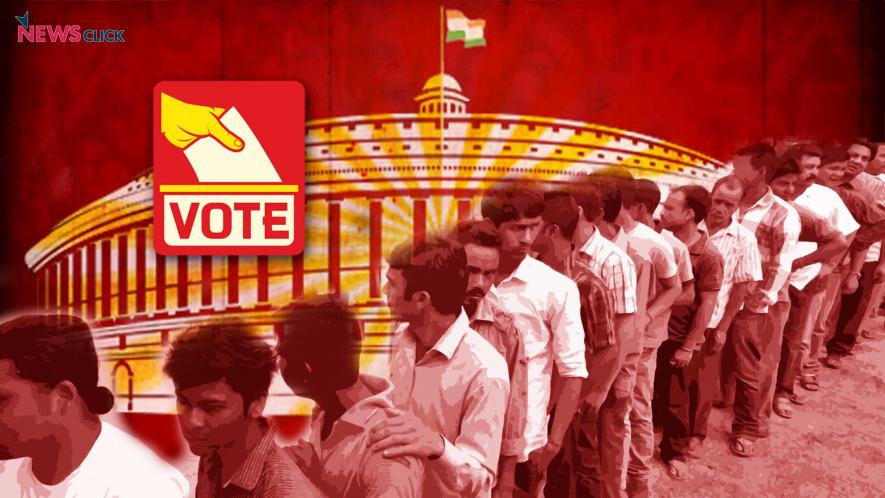‘One Nation, One Election’: Holding Elections Simultaneously not Feasible at All

Newsclick Image by Nitesh Kumar
‘One nation, One election’ is being peddled across the country as the best method to have elections. This idea is being propagated with the same enthusiasm with which the present regime had sold the Goods & Services Tax – One nation One tax – to the people. A parliamentary committee submitted its report on “Feasibility of Holding Simultaneous Elections to the House of People (Lok Sabha) and State Legislative Assemblies” in December 2015.
A committee in the Rajya Sabha, that was headed by Anand Sharma of the Congress examined the above the above recommendations. But before the committee could come out with its report, Sharma has been removed from his post of the chairpersonship and in Bhupender Yadav of Bharatiya Janata Party (BJP) is likely to take his place. It has been reported that the committee was debating electoral reforms in the country and Sharma had written to all the parties, asking for their views on paid news, first-past-the-post system, internal democracy, etc. All the parties responded with suggestions except Yadav who sought additional time thrice.
With Yadav likely to head the committee, it is possible that there would be a push for simultaneous elections for the Parliament and the state legislatures.
In December 2015, a committee headed by Dr E.M. Sudarsana Natchiappan had submitted a report on the issue. Most parties in the committee had opposed the idea in total or with suggestions.
The primary stakeholders – the political parties - had varied opinions in the report:
Indian National Congress:
The proposal of holding simultaneous elections, ideal as it may sound, is impractical, unworkable and can lead to a scenario where the necessary balance in Indian democracy given the diversity of the country is lost.
Nationalist Congress Party (NCP) said that the holding elections of Lok Sabha and State Assemblies “simultaneously was not feasible.”
Communist Party of India:
To conduct the elections simultaneously all the Legislative Assemblies cannot be unilaterally abolished for no fault of them. This idea is unscientific and impracticable. We are of the considered view that in the present situation we do not consider it feasible to conduct elections to both the Houses at one go.
Though the Communist Party of India (Marxist) had not given a written submission to the committee, they had stated that holding parliamentary and state elections together would change the characteristics of the state-centre relations and also would reduce the tenure of the state assemblies that have a different schedule of elections.
Parties like Asom Gana Parishad (AGP), and Indian Union Muslim League (IUML) supported it in toto. While parties like the All India Anna Dravida Munnetra Kazhagam (AIADMK), Shiromani Akali Dal (SAD) supported the idea in principle, they also made suggestions on how to conduct simultaneous elections.
The Election Commission of India which is the constitutional body to conduct different elections in the country had also pointed out several difficulties which might be encountered in conducting the elections:
Simultaneous conduct of elections would require a large-scale purchase of Electronic Voting Machines and Voter Verifiable Paper Audit Trail (VVPAT) machines. For conducting simultaneous elections, the Commission expects that a total of rupees 9284.15 crores will be needed for procurement of EVMs and VVPATs. The machines would also need to be replaced every fifteen years which would again entail expenditure. Further, storing these machines would increase the warehousing cost.
Speaking on the issue, Sanjay Kumar of Centre for Developing Societies (CSDS) has said that this kind of elections would benefit the dominant national parties as people tend to vote for the same party at the centre and the state level.
Praveen Chakravarthy of IDFC Institute has studied the election trends of the country and has pointed out that from 1999 the “trend of choosing the same party has gone from 68% in 1999 to 77% in 2004 to 76% in 2009 and 86% in 2014.”
This is the reason that the current regime ruled by the BJP is rooting for holding elections on the slogan “One Nation. One Election” as it has the money and media to support it in the 2019 elections. If the party is successful, experts say that the current democratic setup would completely change and the regional and smaller parties would become irrelevant. The report, however, did not mention what would be the nature of elections to elect the Rajya Sabha members, as it is a permanent house and with the elections being held simultaneously would there be a need to have the upper house at all. The current system of elections being held separately have time and again put a check on the central government’s anti-people policy and governance.
Some experts say that these reforms would make our nation move towards a presidential system from the current parliamentary system. One organisation, Foundation for Democratic Reforms has precisely argued for the presidential form of elections by stating ‘Westminster model is not conducive in the long run for holding simultaneous elections’ and hence argued for ‘direct elections for the State Executive’. The arguments that it is an expensive affair to hold elections and burden on the state are indirectly arguing for the non-democratic polity.
The constitution makers of the country after studying different forms of governments in the world have settled for a parliamentary form of government with a multi-party system. But the designs of the current establishment seem to be aimed at turning India into a one-party system.
Disclaimer: The views expressed here are the author's personal views, and do not necessarily represent the views of Newsclick.
Get the latest reports & analysis with people's perspective on Protests, movements & deep analytical videos, discussions of the current affairs in your Telegram app. Subscribe to NewsClick's Telegram channel & get Real-Time updates on stories, as they get published on our website.
























